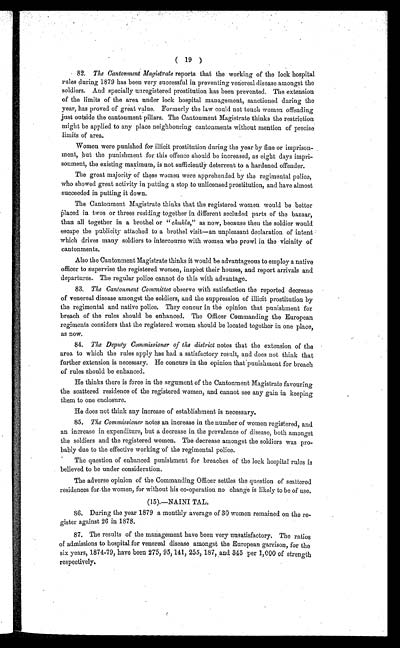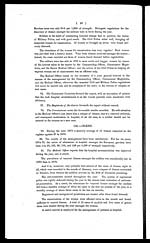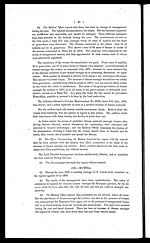Medicine - Institutions > Lock hospitals > Annual report on the working of the lock hospitals in the North-Western Provinces and Oudh > Sixth annual report of the working of the lock hospitals in the North-Western Provinces and Oudh, for the year 1879
(209) Page 19
Download files
Individual page:
Thumbnail gallery: Grid view | List view

( 19 )
82. The Cantonment Magistrate reports that the working of the lock hospital
rules during 1879 has been very successful in preventing venereal disease amongst the
soldiers. And specially unregistered prostitution has been prevented. The extension
of the limits of the area under lock hospital management, sanctioned during the
year, has proved of great value. Formerly the law could not touch women offending
just outside the cantonment pillars. The Cantonment Magistrate thinks the restriction
might be applied to any place neighbouring cantonments without mention of precise
limits of area.
Women were punished for illicit prostitution during the year by fine or imprison-
ment, but the punishment for this offence should be increased, as eight days impri-
sonment, the existing maximum, is not sufficiently deterrent to a hardened offender.
The great majority of these women were apprehended by the regimental police,
who showed great activity in putting a stop to unlicensed prostitution, and have almost
succeeded in putting it down.
The Cantonment Magistrate thinks that the registered women would be better
placed in twos or threes residing together in different secluded parts of the bazaar,
than all together in a brothel or "chukla," as now, because then the soldier would
escape the publicity attached to a brothel visit—an unpleasant declaration of intent
which drives many soldiers to intercourse with women who prowl in the vicinity of
cantonments.
Also the Cantonment Magistrate thinks it would be advantageous to employ a native
officer to supervise the registered women, inspect their houses, and report arrivals and
departures. The regular police cannot do this with advantage.
83. The Cantonment Committee observe with satisfaction the reported decrease
of venereal disease amongst the soldiers, and the suppression of illicit prostitution by
the regimental and native police. They concur in the opinion that punishment for
breach of the rules should be enhanced. The Officer Commanding the European
regiments considers that the registered women should be located together in one place,
as now.
84. The Deputy Commissioner of the district notes that the extension of the
area to which the rules apply has had a satisfactory result, and does not think that
further extension is necessary. He concurs in the opinion that punishment for breach
of rules should be enhanced.
He thinks there is force in the argument of the Cantonment Magistrate favouring
the scattered residence of the registered women, and cannot see any gain in keeping
them to one enclosure.
He does not think any increase of establishment is necessary.
85. The Commissioner notes an increase in the number of women registered, and
an increase in expenditure, but a decrease in the prevalence of disease, both amongst
the soldiers and the registered women. The decrease amongst the soldiers was pro-
bably due to the effective working of the regimental police.
The question of enhanced punishment for breaches of the lock hospital rules is
believed to be under consideration.
The adverse opinion of the Commanding Officer settles the question of scattered
residences for the women, for without his co-operation no change is likely to be of use.
(15).—NAINI TAL.
86. During the year 1879 a monthly average of 30 women remained on the re-
gister against 26 in 1878.
87. The results of the management have been very unsatisfactory. The ratios
of admissions to hospital for venereal disease amongst the European garrison, for the
six years, 1874-79, have been 275, 95, 141, 255, 187, and 345 per 1,000 of strength
respectively.
Set display mode to: Large image | Zoom image | Transcription
Images and transcriptions on this page, including medium image downloads, may be used under the Creative Commons Attribution 4.0 International Licence unless otherwise stated. ![]()
| Permanent URL | https://digital.nls.uk/75111459 |
|---|




